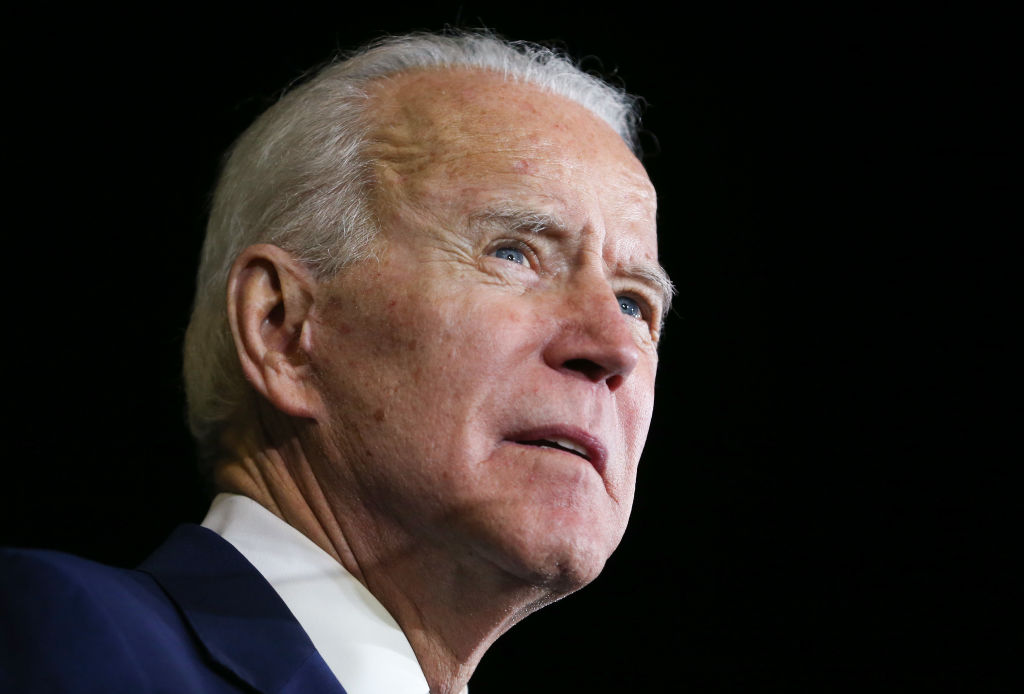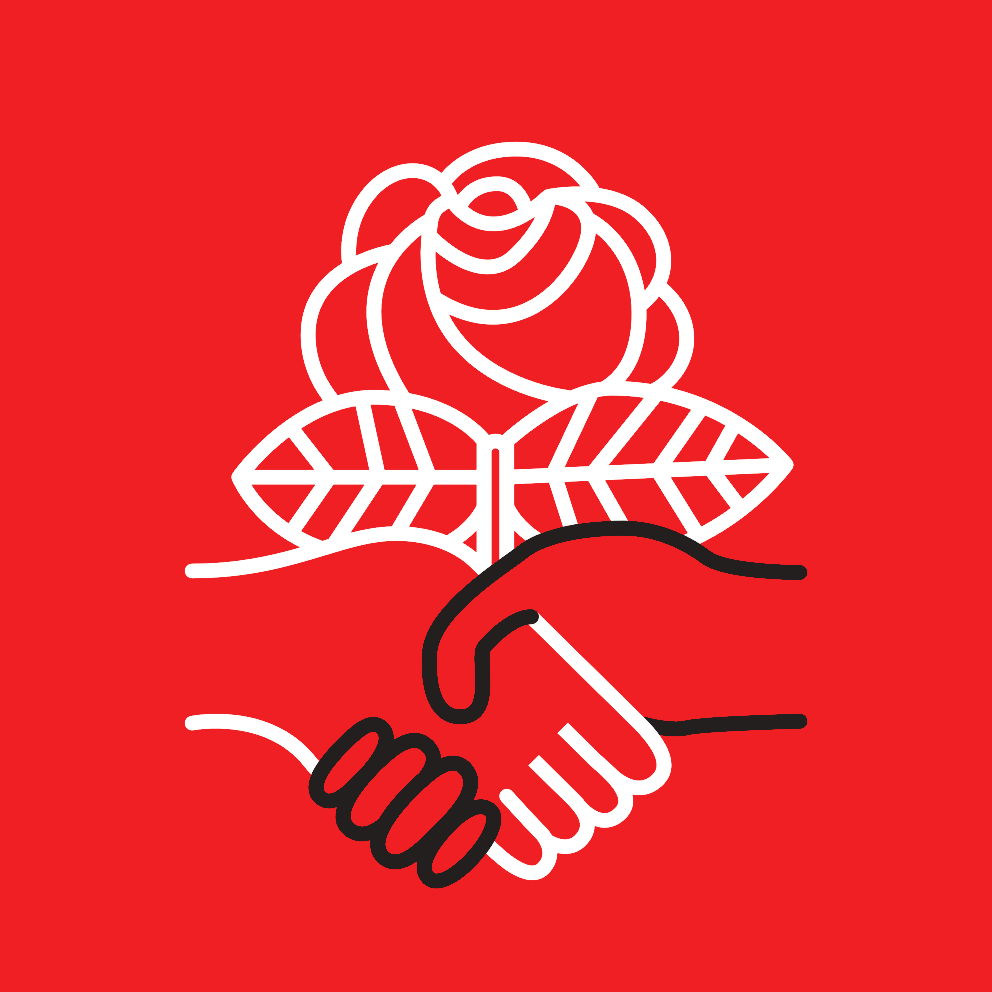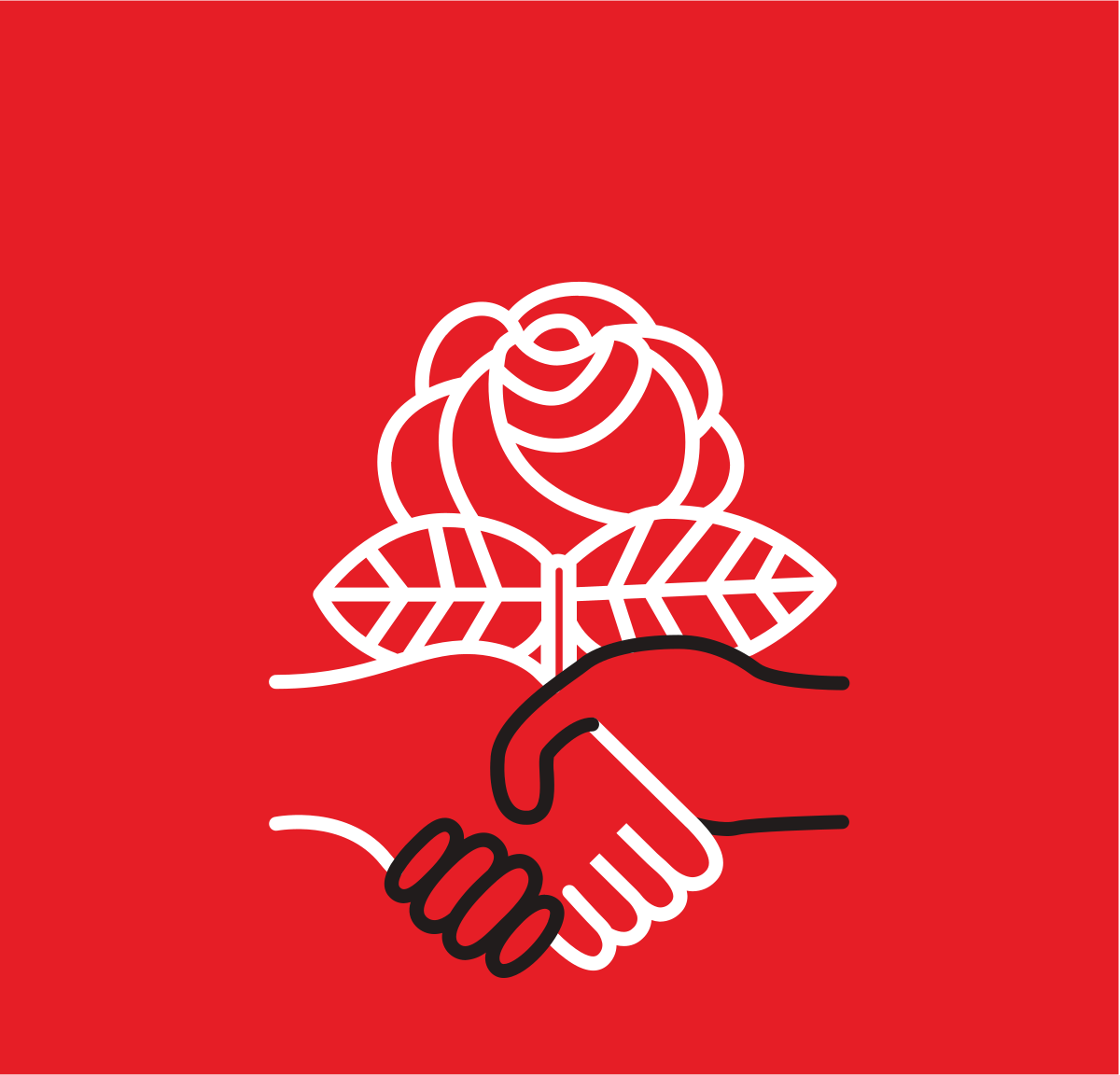*** The current count of the DSA is now far above 85,000 people and rising by the day. So, the 56,000 number below is outdated.
DSA’s growth — from 6,000 to 56,000 in a little more than two years — didn’t happen during the financial crash, or Occupy Wall Street, or even Sanders’s campaign. It happened after Donald Trump was elected. The staid and uncool Democratic Establishment, by blowing a gimme election, had discredited itself. Once she lost, Hillary Clinton’s cautious agenda, largely premised on electability and market-friendly incrementalism, seemed impossible to justify. If the existing, compromised political Establishment was crumbling, why not build something more daring to replace it?
Last summer, at a sold-out Strand event to promote their New York
Times’ best-selling book,
Chapo Trap House host Will Menaker laid out the tactical id of young socialism. “Liberals think they want the same things we do, but they’re just skeptical that this is too extreme or this is going to turn off more moderate people. You’re not even winning elections anymore, so why would we be playing from your playbook?” he said. “Any mild reform to capitalism or our society will be called socialism anyways, so why not just go whole hog and ask for what you really want to achieve?” And so, two years after we were supposed to usher in our second era of Clintonian triangulation, we’re staring down this country’s most serious flirtation with socialism since the 1930s (all while the right aligns itself with Russia and supports a coup in Venezuela).
Many socialists distance themselves from Chapo, which for many embodies Bernie-bro machismo. But its zero-sum politics and caustic nihilism — the exact inverse of the Establishment-liberal
Pod Save America—have set the tone for socialist discourse, especially in contrast to the pieties of the identity-politics left, the righteousness of the #resistance, or the smug wonkishness of Vox. As a result, its enemy isn’t so much Trumpism as the gauzy liberal triumphalism — like the Broadway musical Hamilton — that papers over the indignities of American life. Anyone who feels otherwise is clinging to an outmoded
West Wing fantasy of American politics.
In this way, socialism is as much a repudiation of crash-era capitalism as it is of postrecession
liberalism. The Democratic Party, which gave us the New Deal, had long ago lost its working-class soul. Democrats promoted valuable causes — gun control, combating climate change — but rarely challenged the economic elite. As
n+1 editor Nikil Saval wrote, liberalism had become a “politics in which government cravenly submits to corporate power and cultural debates distract from material needs.” He cited examples: “The chief executive of Patagonia being hailed as a leader of ‘corporate resistance to Trump’ or Chelsea Clinton’s accusing Steve Bannon of ‘fat shaming’ Sean Spicer.”
The race to the left was stoked by an attitudinal shift in the young, mainstream press. Before it was sued out of existence by a revanchist libertarian billionaire, Gawker Media embodied the arch, ironic sensibility of New York’s online-media ecosystem. Now its alumni earnestly proselytize labor unions. (“Peace to the Denver teachers on strike today. America is with you,” tweeted
Gawker alum Hamilton Nolan recently.) Across the industry, editorial staffs of a number of publications, including this one, have unionized.
Meanwhile, the magazine
Jacobin — named for the insurgents who led France’s murderous Reign of Terror during the Revolution — has only grown in influence since its 2010 founding, popularizing socialism for a wider audience (“Are Workers the ‘Gravediggers’ of Capitalism?”; “Eight Marxist Claims That May Surprise You”) and elevating a new generation of leftist voices. But Twitter — a medium that structurally encourages moral grandstanding, savage infighting, and collective action — is where young socialism lives.
For those on the left not enamored of democratic socialism, these trends have been destabilizing. “If you set yourself up to represent the progressive flank of politics and someone says, ‘Actually, you’re a centrist, we are the left,’ it shakes your identity, your career, your influence,” says Leonard. Confronted with a more muscular politics than previously seemed possible, many liberal skeptics have quietly nudged themselves left. In the wake of the Amazon pullout, de Blasio abruptly reversed himself, and an account that tracks copy changes in the
Times caught this revealing tweak: “FOR SOME 2020 DEMOCRATS, REJECTION OF AMAZON ALIGNS WITH
FAR-LEFT LIBERAL POLICY VIEWS.”
Last year, Audrey Gelman of the women’s co-working space the Wing, and
Lena Dunham of
Girls — both Hillary Clinton backers in 2016 — held competing events for Ocasio-Cortez and millionaire actress Cynthia Nixon, who in
her gubernatorial campaign against Andrew Cuomo declared herself a democratic socialist. People stuck red roses next to their Twitter avatars and started calling each other “comrade.” And while in theory socialism connoted a collectivist politics, in practice it ended up becoming a new identity category around which to rally.
DSA is still a sixth the size of the Rotary Club, and only two of its members are in Congress. But in a populist moment defined by an ever-widening income gap, its platform has tremendous currency.
Ocasio-Cortez’s Green New Deal has become a signature, if controversial, Democratic policy, and Sanders is considered a presidential front-runner even as Trump and the
Breitbart right have settled on #socialism as their new bogeyman. In February, Mitch McConnell denounced DSA on the floor of the Senate. It’s hard not to feel that a cultural primary has been won when
Fox News’
Tucker Carlson is suddenly delivering viral pro-worker, anti-capitalist rants on the air.
Toward the end of the Red Party, I find Brostoff and Leonard standing by the open windows at the far end of the loft, where smokers are exhaling in the direction of the Manhattan Bridge. Online, atomized young socialists affect cynical despair about the Trumpy hellworld that engulfs them. In real life, at parties like this one, the mood is exultant.
“We were putting forth these ideas with enormous confidence because we didn’t have any power,” Leonard says. And now, suddenly, they do.
“So, what’s the plan?” she asks. “Still hashing it out,” she answers herself, grinning. “But we’re definitely not doing a worse job than the people running shit now.”
A South Brooklyn DSA potluck and media-training session.
From left: Photo: Amy Lombard for New York MagazinePhoto: Amy Lombard for New York Magazine
Michael Kinnucan is a widely read — there’s no other way to put this — Facebook essayist, whose sharp commentary has been something of a socialist gateway drug for young DSAers. Over beers in Crown Heights, we’re tracing the origins of the movement. The most straightforward explanation for the socialism boom is, fittingly, a material one: Saddled with student debt and thrust into a shit post-2008 economy, millennials were overeducated, downwardly mobile, and financially insecure. On top of everything, the internet was making them feel bad and the planet was melting. The precariat, they called themselves.
In between frequent cigarette breaks, Kinnucan sketched his version of this progression. Graduate from the University of Chicago in 2009; get bogged down in the post-crash economy; drift to Occupy Wall Street in 2011; get radicalized. “There was a Twitter hashtag and internet meme, #SIFUAB: Shit is fucked up and bullshit,” he recalled fondly. “There was a large element of collectivizing depression. The genre of meme where you write on a piece of paper and hold up the amount of student loans you have.”
He mentioned another Occupy hashtag: #nodads. It means, loosely, “Screw the Man.” And the anti-Establishment cynicism it connoted precluded people like him from engaging in something as compromised as electoral politics. When Occupy died, Kinnucan withdrew from activism, worked on his writing, and scraped by as a math tutor. Two things changed that. First, Bernie. “Sanders was different, because Sanders was the idea that most people agreed with us and we could just win outright. Not, like, block highways and get arrested, but some day take power.” Then, Trump. “It took an emotional crisis,” as Kinnucan puts it, to get off the sidelines.
If liberals have moved left ideologically, the far left has moved to the center tactically by getting involved in elections at all. Ocasio-Cortez’s political awakening happened in similar fashion. She graduated from Boston University in 2011, worked a bunch of crap jobs to pay off her debt, volunteered on the Sanders campaign, protested at Standing Rock, then ran for office. While she wasn’t incubated in DSA, she started appearing at meetings and joined the organization, securing its endorsement and grassroots manpower. In June 2018, when she knocked off congressional heavyweight Joe Crowley, it legitimized not just DSA but its electoral strategy of supporting Democratic candidates.
Last summer, smitten with AOC, a fascinated national media descended on New York to find an organization all-in on a new race: the State Senate campaign of 27-year-old Bushwick organizer
Julia Salazar. The press got excited because her profile — photogenic Columbia-educated Latina socialist — resembled AOC’s. Democratic socialists, meanwhile, were even more thrilled: Unlike Ocasio-Cortez, Salazar was a true product of DSA and had gotten her start at a Jacobin reading group. Michael Kinnucan was her spokesperson.
In early August, a month before the primary, the Salazar campaign hosted a comedy fund-raiser at a Bushwick beer garden called the Well headlined by
Chapo Trap House. Given the demographic — white, 21-to-36-year-old Tecate drinkers — the draw couldn’t have been bigger. Ocasio-Cortez was supposed to show up, and the event sold out. Right away, I met someone who had recently taken a job at
New York, whose sister was dating Virgil Texas, one of the
Chapo hosts, and who was accompanied by a friend who worked for
Vogue who also happened to be a friend of a friend. (One of the most noticeable aspects of New York’s left-wing insurgency is the proliferation of socialist VIPs you used to know from completely different contexts. Kinnucan, though he didn’t remember me, briefly attended the same high school I did.)
Socialism is frequently tagged as the province of polemical white guys, and when
Chapo went on, Virgil Texas — not his real name — gestured at the show’s Bernie-bro reputation. “We are three men here to explain why those speakers are wrong,” he began, referring to the women who preceded them. “This event is now the Well, Actually.” While the racial breakdown was indeed a little awkward — Latina candidate onstage, white allies in the beer tent — it was nothing new for the nearly all-Caucasian DSA left.
The more interesting tension at the event was generational. Appearing earlier onstage had been 47-year-old attorney-general candidate Zephyr Teachout, who ran a competitive gubernatorial primary against Cuomo in 2014 and, this time around, earned the endorsement of the Times. But her granola Gen-X progressivism — her main issue is anti-corruption — didn’t thrill the crowd. Salazar, a political neophyte running for a less significant office, had more luck. “There’s a movement behind us,” she declared. “I’m a member of the Democratic Socialists of America, and I have this team of fellow dirtbag leftists.” She paused to marvel at the power of the word socialist. “It’s so cool that you’re clapping for that right now.”
What were they clapping for exactly? The amorphousness of the word has left it open to a number of critiques.
Chapo devoted its set to helping the crowd debunk anti-socialism talking points. “This is the main one that anyone on television is going to be asked,” said Menaker. “ ‘How’s it going to get paid for?’ We’ve already seen Alexandria get asked over and over. It’s important to come up with a smart response. The smart response is: ‘All the numbers are correct. All this is true about the deficit. But, fuck the deficit because it’s not real and it doesn’t matter.’ ” The audience whooped. Another option, he said, is to “turn all the existing billionaires into millionaires. Or Soylent.”
Ocasio-Cortez didn’t show. By the end of the night, people were buzzed and no one cared. Someone bought Menaker tequila shots for his birthday, and Salazar explained to a new fan the difference between her brand of socialism and the guerrilla Marxism of Colombia’s farc rebels. I struck up a conversation with Virgil Texas, who was sucking on a Juul and drinking from a plastic cup of frozé. As we discussed Chapo’s then-forthcoming book, subtitled “A Manifesto Against Logic, Facts, and Reason,” a 23-year-old self-proclaimed venture capitalist named Michael introduced himself. He asked that I not use his last name, because his parents fled the Soviet Union and hate socialism. “I’m a little conflicted about my life choices,” he told us. “It’s weird to say, but thank you. I went from a neoliberal Hillary Clinton fan to, like, questioning everything I believed.” Virgil, in between drags, nodded approvingly. Michael continued. “That was my shit, dude. I was so pragmatist. I was all about it. And then I was like, This makes no sense.”
Within a couple weeks, Salazar would be accused of fabricating basically everything about herself, from her supposed immigrant status to her supposed lack of wealth, to say nothing of a weird identity theft allegation, which she successfully challenged, involving the ex-wife of former Met Keith Hernandez. Just as these stories were coming out, DSA threw a massive party at the Verso loft.
“Everybody looks fuckin’ sexy as hell,” shouted Cunningham, NYC-DSA’s co-chair. “This is amazing to have everybody here looking beautiful in the same room, spreading the message of socialism. Give yourselves a round of applause.”
DSA was founded, to little fanfare, in 1982 by the social theorist Michael Harrington. Harrington’s group occupied the “left wing of the possible,” a sensible enough mantra that excited nobody and helped the organization stay minuscule for decades. DSA now has branches in all five boroughs, three in Brooklyn alone.
Along with its growth, DSA became way more ecumenical and, like any good leftist organization, riven by factionalism. DSA’s most vocal faction is Spring Caucus, which until recently was known as Momentum, a
Jacobin-heavy bloc of Medicare for All fanatics that seems to be folding itself into the Bernie Sanders effort. Spring’s critics say it’s dominated by “class reductionist” white men who ignore matters of race and gender.
This is where the brand-new Socialist Majority Caucus, which seeks to be more inclusive, comes in. Beyond that, there are the libertarian socialists, or anarchists, who are skeptical of electoral work. There is the North Star Caucus, which is holding down the old “left wing of the possible” line. At the Verso party, I ran into a libertarian-socialist guy whom I hadn’t seen since college, and who told me that “North Star is the worst thing you can call someone in DSA.” Then there are disbanded groups like the ReFoundation caucus, which was populated by Fidel Castro sympathizers and Stalinoid tankies. Finally, there are all the nondenominational socialists, who couldn’t care less and just want to do the work. And while the sheer amount of random stuff going on every night can feel like leftist self-parody — “eco-socialist working group”; “North Brooklyn Night School Session 19 — The Lenin Controversy” — DSA’s wide-open democratic structure has also empowered its members.
In the middle of the dance floor I ran into Nicole Carty, a DSA-curious professional organizer I also hadn’t seen since college, who made a name for herself doing tenant work after Occupy Wall Street. (DSA can feel like a never-ending Brown University reunion.) “Movements are, yeah, about causes and about progress and beliefs and feelings, but the strength of movements comes from social ties and peer pressure and relationships,” Carty said. “People are craving this. Your social world intersecting with your politics. A world of our own.”
DSA is led by its dues-paying members, rather than paid staff. It is, essentially, bossless. That has allowed the organizers to reflect back to those members the world they’re trying to create. “It’s playing the role of a place where they seek a sense of fulfillment and rootedness that they otherwise lack in their lives,” says a writer acquaintance, Sam Adler-Bell, yet another Brown graduate and a DSA member. Socialism was appealing not because it promised equality but because it looked like liberation.
appeal to college-educated white people,” McElwee said. Sanders, meanwhile, is hoping for a somewhat broader appeal.
Why is there no socialism in the United States? That’s the famous question the social theorist Werner Sombart asked in 1906, anticipating the next century of American capitalist hegemony. His answer: “roast beef and apple pie.” Then why did socialism still fail to catch on in periods of deprivation and unrest? Decades later, Daniel Bell, a Harvard sociologist, offered an alternative explanation. Socialists were forever doomed to the margins, he argued, because their idealistic causes were at odds with the political compromises necessary to see them realized.
Lately, the democratic-socialist left has found something of a middle path. Candidates like Ocasio-Cortez and Sanders are no longer too precious to run on the Democratic ticket, though the proposals they suggest are so ambitious — like Medicare for All, a Green New Deal, and free public college — that they don’t feel like compromises at all. The week after Sanders announced his presidential bid, the socialist left coalesced around him completely (Elizabeth “I am a capitalist to my bones.” Warren was out of the question) as hundreds of thousands of donations, worth $10 million, flowed into his campaign.
Jacobin, meanwhile, released its latest issue, imaging a world in which Sanders was already president. Mainstream politics finally seemed to be catching up to the long-marginalized left. “Is there a point in spending all day trying to explain, like, the Marxist theory of exploitation to some 18-year-old?” Sunkara asked at the issue launch. “Yes! Because that kid might be the next Bernie Sanders.”
Last week, I went to the monthly general meeting of DSA’s North Brooklyn branch in Bushwick. I was expecting talk of the campaign to dominate the meeting, which, as ever, was packed. Instead, the agenda — elected civilian-review board, ending school suspensions, Medicare for All/NY Health Act, and a 45-minute training session for a political tactic called “bird-dogging” — had nothing to do with Sanders at all. It turned out that a byzantine endorsement process, requiring ratification by a 35-member board called the Citywide Leadership Committee, needed to take place before DSA could get formally involved with the Sanders campaign.
At first blush, this seemed ludicrous. Finally, the left was in striking distance of seizing serious political power in America, and it was getting bogged down by bureaucracy. And yet: All those people came out and sat through a bird-dogging seminar in deep Brooklyn on a freezing Tuesday and didn’t even seem to mind. Like devoted members of a social club, or a church parish, Brooklyn’s young left seemed to be building something designed to outlast the vagaries of a campaign, or transcend the personality cult of its politicians, and in doing so keep alive the embers of an idea that’s lived and died so many times before.
*A version of this article appears in the March 4, 2019, issue of New York
Magazine. Subscribe Now!



 www.dsausa.org
www.dsausa.org

 en.wikipedia.org
en.wikipedia.org

www.dsausa.org

en.wikipedia.org

